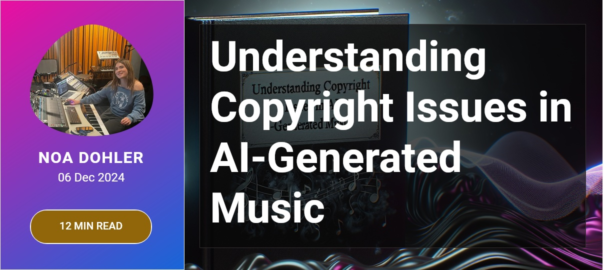Mubert AI revolutionizes music creation – future or threat?
The music industry stands at a crossroads where artificial intelligence is reshaping creative boundaries. As we’ve previously explored in our discussion about ethical considerations in AI music, the emergence of sophisticated platforms like Mubert AI presents both unprecedented opportunities and complex challenges for creators worldwide.
Last month, I experimented with an AI music generator during a live performance. The audience was captivated, yet puzzled when I revealed the true composer. Their reaction perfectly encapsulated the current dialogue around AI in music: fascination mixed with uncertainty.
Understanding the Mubert AI Revolution
The emergence of Mubert AI represents a significant shift in music production paradigms. According to recent legal analysis, AI-generated music is challenging traditional concepts of creativity and authorship. The platform’s ability to generate original compositions in real-time has attracted over 1 million users worldwide, demonstrating the growing acceptance of AI in creative processes. The technology employs sophisticated algorithms that analyze patterns from vast musical databases, enabling it to create unique compositions across various genres. This development raises fundamental questions about the nature of creativity and artistic expression. As the platform continues to evolve, its impact on professional musicians and composers becomes increasingly significant, transforming how we think about music creation and distribution.
Copyright Challenges in the AI Era
The legal landscape surrounding music AI is rapidly evolving. According to the U.S. Copyright Office’s recent guidance, AI-generated works face unique challenges in securing copyright protection. This has created a complex environment where traditional copyright frameworks struggle to accommodate new forms of creative expression. The current legal system, designed for human creators, must adapt to address AI’s role in music production. Musicians and producers using AI tools face uncertainty regarding ownership rights and revenue distribution. These challenges extend to streaming platforms and licensing agreements, where the distinction between human and AI contributions becomes increasingly blurred.
The Future of AI Lofi Music Generation
The rise of AI lofi music generators marks a significant transformation in the music industry. Recent data from industry sources indicates that AI-generated lofi music is gaining substantial traction on streaming platforms. The technology has evolved to create sophisticated compositions that rival human-made tracks in terms of quality and emotional resonance. This development presents both opportunities and challenges for independent artists and major labels alike. The accessibility of these tools democratizes music creation while raising questions about artistic authenticity and market saturation.
Legal Framework Evolution
The legal landscape is rapidly adapting to accommodate AI-generated music. According to recent developments, major music publishers are actively engaging in shaping new copyright frameworks. These changes aim to protect both traditional artists and AI innovators. Legal experts suggest that hybrid approaches, recognizing both human and AI contributions, may become the norm. This evolution requires careful consideration of artistic rights, fair compensation, and technological innovation. The challenge lies in creating regulations that foster innovation while protecting creators’ rights.
Innovation Opportunities in AI Music
Several promising business models are emerging in the AI music space. Companies could develop subscription-based platforms offering customized AI-generated music for different use cases, from gaming to meditation. Licensing models that combine AI-generated elements with human curation could create new revenue streams. Start-ups might focus on developing AI tools that augment rather than replace human creativity, creating collaborative platforms that blend human artistry with AI capabilities. The market potential extends to personalized music experiences, where AI adapts compositions in real-time based on user preferences or physiological responses.
Composing Tomorrow’s Harmony
The intersection of AI and music creation opens unprecedented possibilities for artists, producers, and listeners alike. As we navigate this evolving landscape, your perspective matters. How do you envision the future of music creation? Share your thoughts on AI’s role in shaping the future of musical expression, and let’s continue this crucial conversation about balancing innovation with artistic integrity.
Essential FAQ About AI Music Copyright
Q: Can AI-generated music be copyrighted?
A: Currently, the U.S. Copyright Office only recognizes works with substantial human creative input. Purely AI-generated music cannot be copyrighted.
Q: Who owns the rights to music created using AI tools?
A: Ownership depends on the level of human involvement. If significant human creative input exists, rights typically belong to the human creator(s).
Q: Can I use AI-generated music commercially?
A: Commercial use depends on the AI platform’s terms of service and licensing agreements. Always verify usage rights before commercial implementation.
